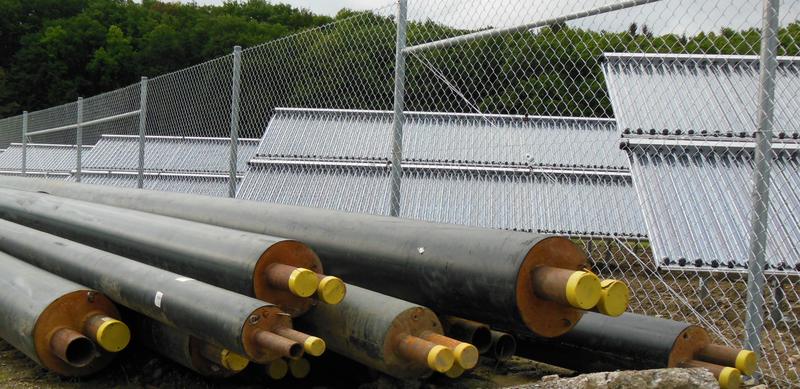
Boosting Renewable Energy in District Heating Networks

District heating networks are useable multifunctional. Plastic casing pipes and evacuated tube collectors in a large-scale plant are depicted here.
© Heiko Huther, AGFW
The German government has set the target of covering 14 per cent of the heat market from renewable energy sources by 2020. The BINE Projektinfo brochure “Making district heating renewable” (13/2014) describes the potential makeup of a district heating supply transformation.
Researchers have investigated the energy sources most suitable in this regard from a technical and scientific perspective. Citing results from model regions and best practice examples, the researchers have developed strategies for the future.
In the “Transformation strategies for district heating supply” study, the researchers looked at the potential effects of integrating wood-origin biomass, biogas and biomethane as well as solar thermal and geothermal energy on the efficiency of heating networks.
Findings included: Many renewable energy sources and low temperature waste heat in combination with heat pumps were found to reach their capacity limits at supply temperatures greatly above 100 °C. In nine existing networks investigated, biomass and geothermal energy were found to be the renewable energy sources accounting for the greatest share of heat generation.
For the model regions of Ulm and Jena, the researchers developed strategies for the transformation of district heating supply. With in excess of 50 per cent of heat generation covered by renewable resources, Ulm has already become a forerunner is this area. In Jena, this value could be achieved by 2030 if the total heating requirement is reduced due to renovation works. The Stadtwerke Jena-Pößneck municipal utility companies are currently reviewing new options for the city’s energy supply in the “Integrated energy and heating concept 2050”.
The researchers have also developed a decision tree for operators of district heating networks. Operators can use this tool to investigate how they can increase the proportion of renewable energy sources in their supply systems. The “Transformation strategies for district heating supply” study was conducted by the IFEU institute, GEF Ingenieur AG and the AGFW (German energy efficiency association).
For further informations about the BINE-Projektinfo brochure BINE Projektinfo brochure “Making district heating renewable” (13/2014) follow this link:
Press contact
Uwe Milles
presse(at)bine.info
About BINE Information Service
Energy research for practical applications
The BINE Information Service reports on energy research topics, such as new materials, systems and components, as well as innovative concepts and methods. The knowledge gained is incorporated into the implementation of new technologies in practice, because first-rate information provides a basis for pioneering decisions, whether in the planning of energy-optimised buildings, increasing the efficiency of industrial processes, or integrating renewable energy sources into existing systems.
About FIZ Karlsruhe
FIZ Karlsruhe – Leibniz Institute for Information Infrastructure is a not-for-profit organization with the public mission to make sci-tech information from all over the world publicly available and to provide related services in order to support the national and international transfer of knowledge and the promotion of innovation.
Our business areas:
• STN International – the world’s leading online service for research and patent information in science and technology
• KnowEsis – innovative eScience solutions to support the process of research in all its stages, and throughout all scientific disciplines
• Databases and Information Services – Databases and science portals in mathematics, computer science, crystallography, chemistry, and energy technology
FIZ Karlsruhe is a member of the Leibniz Association (WGL) which consists of 87 German research and infrastructure institutions.
Weitere Informationen:
http://www.bine.info/en – BINE Informationsdienst english












